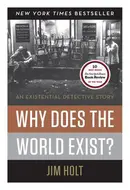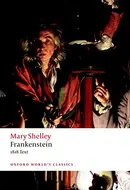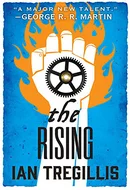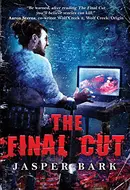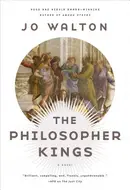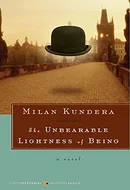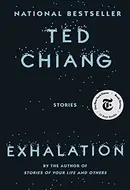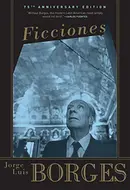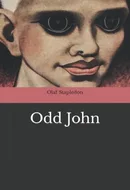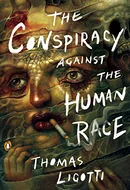Books matching: philosophical exploration
100 result(s)
Readers also searched for:
Jim Holt's book 'Why Does the World Exist?: An Existential Detective Story' delves into the profound question of why there is something rather than nothing. Holt embarks on a journey to explore this existential mystery by interviewing renowned scientists, philosophers, and writers, presenting their diverse perspectives on the origins of the universe. Through thought-provoking conversations and interludes detailing snippets of his own life, Holt navigates complex theories of cosmology, metaphysics, and theology, making the abstract concepts accessible to readers. The book skillfully weaves together historical and modern thoughts on existence, challenging readers to contemplate the fundamental nature of reality and the human quest for understanding.
Holt's writing style is engaging and thought-provoking, blending intellectual inquiry with personal anecdotes and philosophical musings. With a blend of humor, curiosity, and intellectual rigor, he guides readers through a narrative that humanizes the profound questions of existence. The book offers a comprehensive exploration of the various explanations provided by theologians, physicists, and philosophers throughout history, inviting readers to ponder the mysteries of the universe and confront the complexities of existence.
I would earnestly warn you against trying to find out the reason for and explanation of everything. . . . To try and find out the reason for everything is very dangerous and leads to nothing but disap...- #2
'Frankenstein' by Mary Wollstonecraft Shelley is a classic horror novel that tells the story of Dr. Victor Frankenstein and the creature he creates. The plot explores themes of creation, rejection, loneliness, and the consequences of playing god. The writing style varies from flowery and old English to deep and meaningful, with a focus on exploring human emotions and philosophical questions through the perspectives of both Dr. Frankenstein and his monster.
I AM BY BIRTH a Genevese; and my family is one of the most distinguished of that republic. My ancestors had been for many years counsellors and syndics; and my father had filled several public situati... - #3
The Rising in the Alchemy Wars series by Ian Tregillis is a continuation that builds on the original world and characters, focusing on the intertwined stories of two brilliant and ruthless women, a freed mechanical servitor finding his moral code, and the philosophical reflections interwoven with action and adventure. The story delves into questions of free will, the nature of evil, and the consequences of humanity's reliance on mechanical servants in an alternative 1800s setting where the Dutch control thinking machines.
(Also, see 29 recommendations for the series The Alchemy Wars ) - #4
'The Final Cut' by Jasper Bark is a gripping horror novel that follows the journey of two struggling filmmakers, Sam and Jimmy, who find themselves deeply entangled in a world of supernatural horror after coming across a disturbing snuff film. As they delve deeper into the dark secrets behind the film, they are drawn into a twisted web of ancient mythology, good versus evil, and the quest for redemption. The narrative weaves together elements of extreme violence, gore, and metaphysical exploration, keeping readers on the edge of their seats as they uncover the layers of the story.
Bark's writing style is described as visceral and intense, with graphic detail that immerses readers into a nightmarish realm of horror. The book expertly balances moments of extreme violence with introspection and philosophical musings, offering a unique blend of terror and depth. Through the characters of Sam and Jimmy, Bark explores themes of sacrifice, redemption, and the consequences of delving into the forbidden realms of the supernatural, creating a story that is both chilling and thought-provoking.
- #5
'The Philosopher Kings' by Jo Walton is a thought-provoking science fiction novel that delves into the consequences of setting up a city based on Plato's Republic. The story follows Apollo, now living in human form, and his daughter Arete, as they navigate grief, exploration, and ethical dilemmas in a society that has fractured into warring cities. Through a blend of Greek mythology, time travel, and philosophical debates, Walton skillfully crafts a narrative that challenges readers to contemplate what it means to be truly human.
The book is praised for its engaging storytelling, accessible exploration of philosophical ideas, and the way it gently suggests connections between ancient Greek philosophy and modern Western narratives. Walton's writing style seamlessly weaves together elements of science fiction, fantasy, and alternate history, creating a unique and captivating reading experience that offers both entertainment and intellectual stimulation.
Very few people know that Pico della Mirandola stole the head of the Winged Victory of Samothrace. In fact he stole it twice. The first time he stole it from Samothrace, before the rest of it was redi...
(Also, see 100 recommendations for the series Thessaly ) - #6
'The Unbearable Lightness of Being' by Milan Kundera is a philosophical novel that delves deep into themes of love, sex, human condition, and relationships. It follows the intertwined lives of four main characters - a doctor, a painter, a waitress, and a professor - set against the backdrop of communism and democracy. The novel is known for its unique narrative style that blends philosophical musings with the characters' stories, creating a complex and thought-provoking read.
Kundera's writing style in 'The Unbearable Lightness of Being' is characterized by its blend of dreamlike imagery and brutal reality, creating a poetic and touching work that explores the weight of existence. The story unfolds through interconnected relationships, where the characters navigate between societal demands, political turmoil, and personal desires, leading to profound reflections on fidelity, betrayal, and the complexities of human nature.
15 While she marched around the pool naked with a large group of other naked women, Tomas stood over them in a basket hanging from the pool's arched roof, shouting at them, making them sing and do kne... - #7
'Exhalation: Stories' by Ted Chiang is a collection of thought-provoking science fiction stories that delve into philosophical questions like free will, consciousness, and the impact of technology on humanity. Chiang's writing style is described as calm, clear, and deeply engaging, allowing the meaning of the stories to shine through the scientific concepts explored. The stories cover a wide range of themes, from time travel to the nature of existence, all tied together by universal questions about humanity and the universe.
The book features a mix of speculative technologies and philosophical undertones, expertly formulated to create compact yet suggestive narratives. Chiang's storytelling is praised for its cleverness without sacrificing the human element of the stories, making readers care about both the characters and the speculative concepts presented. Each story in the collection offers a unique and immersive experience that challenges readers to think deeply about the complex issues explored.
It has long been said that air (which others call argon) is the source of life. This is not in fact the case, and I engrave these words to describe how I came to understand the true source of life and... - #8
Ficciones by Jorge Luis Borges is a collection of short stories that delve into imaginative and thought-provoking realms, exploring concepts such as missing encyclopedia entries, expansive imaginary worlds, and the blurring of reality and fiction. Borges' writing style is described as powerful, dense, and philosophical, with stories that challenge readers to think deeply about literature, language, and the nature of knowledge. The book is a labyrinth of intricate narratives, surreal settings, and metafictional elements that push the boundaries of traditional storytelling.
I owe the discovery of Uqbar to the conjunction of a mirror and an encyclopedia. The unnerving mirror hung at the end of a corridor in a villa on Calle Goana, in Ramos Mejía; the misleading encycloped... - #9
'Odd John' by Olaf Stapledon is a thought-provoking science fiction novel that delves into the concept of superhuman abilities and their impact on society. The book follows the life of Odd John, a character born with exceptional intellectual prowess, as he navigates the complexities of human relationships and societal norms. Stapledon's writing style, although slightly dated, offers a deep reflection on the limitations and possibilities of the human species, presenting a philosophical narrative that challenges the reader's perception of what it means to be human.
John was right. Though I had known him since he was a baby, and was in a sense intimate with him, I knew almost nothing of the inner, the real John. To this day I know little but the amazing facts of ... - #10
'The Conspiracy Against the Human Race' by Thomas Ligotti delves into the horror that consciousness brings about, presenting a pessimistic view on life, mankind, and the universe. Ligotti explores the idea that human existence is a curse, with consciousness being a detriment rather than a benefit. Through references to various philosophers, mystics, and neuroscientists, Ligotti argues that life is inherently meaningless and existence is a painful cul de sac. serves as a philosophical exploration of the horror that comes from being aware of our mortality and the futility of seeking meaning in an indifferent universe.
To avoid all possibility of false appearances, I should disclose up front to being a writer of supernatural horror stories. Strictly speaking, then, The Conspiracy against the Human Race represents mo...
